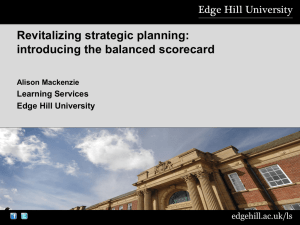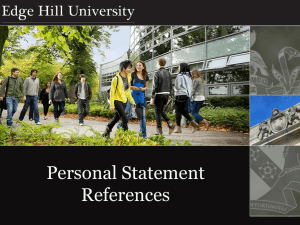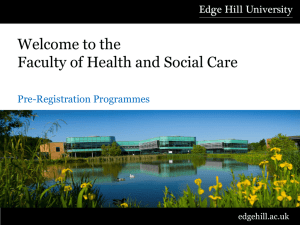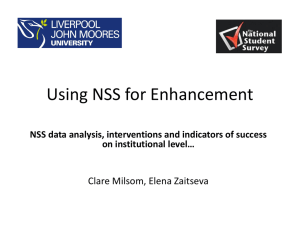and Sector Overview – Steve Igoe
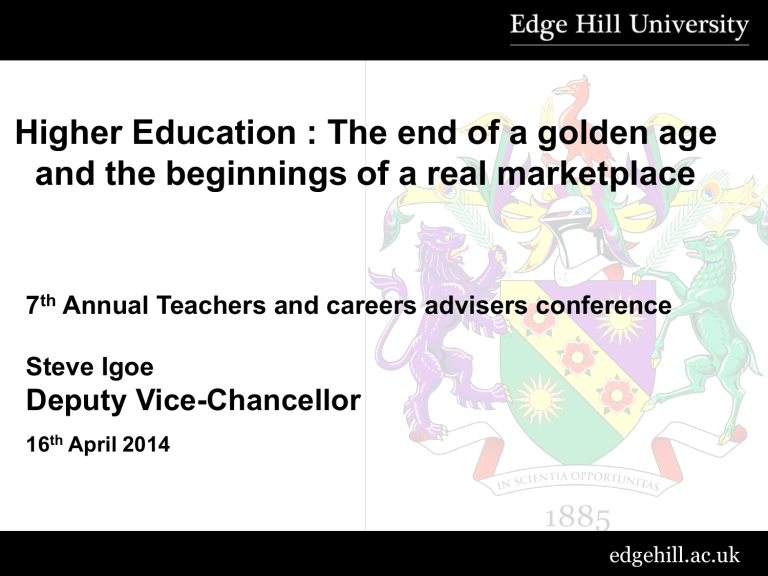
Higher Education : The end of a golden age and the beginnings of a real marketplace
7 th Annual Teachers and careers advisers conference
Steve Igoe
Deputy Vice-Chancellor
16 th April 2014
Aim of Presentation
Our purpose
What we are, what we do
National context
What we need to do to survive and prosper edgehill.ac.uk
Our purpose
The University’s core responsibility is for the ‘student experience’
Within this, the University’s core activities are teaching and learning and research. The vast majority of this
University’s income comes from the former of these activities
Both undertaken in a competitive environment
It is the aim of all staff to be part of these academic endeavours and to support each other
We also play a role (direct and indirect) in the local and regional economy (these include (under-developed) activities) edgehill.ac.uk
What we are, what we do
HE in the UK is a world leader, both in quality of teaching and learning and assurance of teaching quality, and in research output
We can be proud of what we do: we have noble aims
We have no shareholders, we are a collective, surpluses get ploughed back into the University
The University is its staff and student community
We are also a business in a highly competitive sector edgehill.ac.uk
1998-2008: a Golden Decade
• By any measure, HE had a good time:
– Student growth
– Resource
– Research grants and opportunities
– Pay
– Profile
• Where next? Some thoughts:
edgehill.ac.uk
Strong growth in student numbers
Source: UUK edgehill.ac.uk
Education spending in real terms, England only: 1997 –98 to 2008–09 edgehill.ac.uk
Student demographics
Will start to rise from here edgehill.ac.uk
Budget Deficits
edgehill.ac.uk
The Government’s view (1)
• To cut public expenditure and the deficit, indeed to eradicate it
• Feel universities are too comfortable, and do not provide value for money to the taxpayer or the student
• There are huge cuts in HEFCE, TA, SHA income which will leave large cuts even after rise in student fees (+ no indexing) edgehill.ac.uk
The Government’s view(2)
• Current systems fail to sufficiently recognise different roles for different universities (“our best universities”)
• Some believe that there are too many universities, that we can only prove that there is a real market if a number fail
• Too much research at too low a level
• Quality of teaching needs significant improvement
(weak evidence base) edgehill.ac.uk
Risks for the sector
Likely implications for the sector
• We live in unprecedented times
• There are significant cuts in HEFCE, SHA, NCTL funding
• There will be a shift to student self-funding
– Student debt has not deterred FTUG students – but has destroyed PG,
PT, mature markets
– Key driver appears to be reputation and attractiveness of the University
• There will be cuts in government research grants
– Increasing emphasis on partnership with private enterprise for funding
– Continued government funding will contract towards STEM only
• Some universities will close
• Greater Government intervention
• Greater Competition edgehill.ac.uk
Government intervention
• DBIS ‘hands-off’ micro-management (!) to assure the quality and reputation of UK HE
– Introduction of the UK Quality Code for HE (mandatory aspects)
– Requirement to make public a wide range of (comparative)
Institutional data
– Retention of external scrutiny mechanisms to ‘check on us’
• Quantitative judgements (Institutional Audit 2016/17)
– ‘Risk-based’ mantra driving QAA’s external scrutiny of
Universities, eg:
• Large overseas or e-learning portfolios might increase the intensity of scrutiny
• Change in Institutional ownership would trigger an external scrutiny event
• Emergence of more national league tables
• Mechanisms for stakeholders to raise concerns to QAA (and for subsequent action) edgehill.ac.uk
Dfe and NCTL
• Ideology over evidence
• Schools direct and threats to Secondary ITT
• PGCE vs UG
• Demand 2013/14 : The security of supply
• The end of PPD
• Allocations and Ofsted edgehill.ac.uk
DH and Health commisioning
• 2010-13 Commissions
• New structures for social work
• Tensions: Market demand , spending reviews and election politics
• A new purchasing structure
• And from whom
• But what of the “Hard Truths” edgehill.ac.uk
HEFCE – allocated activity
• HEFCE : Funder or Regulator
• HE – A Veblen good
• Student funding : Realities and perceptions
• The future of learner support
• The shifting of responsibility :ALF,DSA ,SOF
• Scholarships and bursaries – Are they worth it ?
• REF and HEIF : A closed shop ?
• The abolition of the SNC and 60,000 more students edgehill.ac.uk
HEFCE – allocated activity
• New Entrants ( for profit and not for profit)
• MOOC’s
• HE in FE
• International and Government immigration policy edgehill.ac.uk
What does this mean for Edge Hill
• Tough times ahead, doing more for less, working smarter, working harder
• But we have the following advantages:
– Attractive campus
– Rising popularity
– Good scores in NSS (needs renewing annually)
– Very strong financial position (but limited endowments/realistic assets)
– Increasing staff numbers bring changing (and positive) student-focussed, academic and research culture edgehill.ac.uk
What does this mean for our staff?
• We must all own the problems and seek their solution
• Demographics and new fee regime means we must further enhance reputation
• We must continue to invest in the campus
• Build our research capacity
• Improve our NSS standing
• Continually revise our provision edgehill.ac.uk
Edge Hill University
Of our 22,000 students around 9,500 on FT programmes
Three Faculties: Arts and Sciences, Education and Health
Main campus at Ormskirk, others at Chorley
(Woodlands), University Hospital Aintree
Other satellite sites, outreach centres; e.g. some health in Manchester
The University has a long and successful history edgehill.ac.uk
Edge Hill University
• We’ve benefitted from the £9000 fee
– Met student number control
– Increasing numbers of ABB students (650 + in 2013)
– Signs of increasing reputation (+40 places, Times/Sunday Times
(2006 – 2013))
• £120m turnover (and increasing)
– £20m surplus
– Building real estate
– Will build reserves (2014/15)
• League tables:
– 2006: 127 th
– 2013: 69 th
• We will survive; indeed continue to grow securely edgehill.ac.uk
Edge Hill Reputation
• Turnover
• Has more than doubled in 7 years
• Surplus of around £19m last year
• Investment of over £180m in new campus facilities in last 7 years
• One of the biggest providers of teacher training/education in the UK
• Had a very good QAA Institutional Audit in 2010 and an OFSTED inspection with 33 grade 1 scores
• Good, and improving NSS outcomes
• Amongst the best student employability (93.5%) in the sector
• REF entries more than doubled since 2008
• Attracting staff from entire HE sector, especially at entry, professorial and reader level
• Amongst top 20 places to work in the public sector (Times 2010) edgehill.ac.uk
Questions?
edgehill.ac.uk
